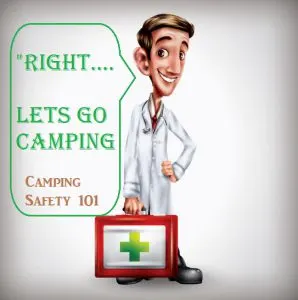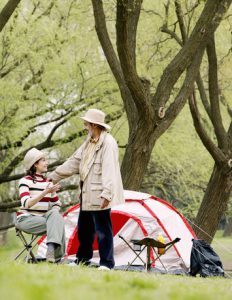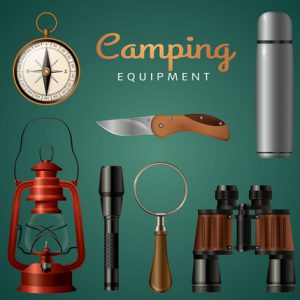 Camping in the wilderness is quite interesting, especially for the first-time camper. But a first-time camper might also be nervous as to what to pack and how to prepare for the trip.
Camping in the wilderness is quite interesting, especially for the first-time camper. But a first-time camper might also be nervous as to what to pack and how to prepare for the trip.
But, nerves and knowing what to pack aside, safety is the #1 item you should be concerned about. Especially if you are camping alone. Learning how to camp safely alone is almost as important as entering into bear country. Both can be potentially dangerous, so its extremely important that you prepare yourself with the knowledge to complete a safe yet fun camping adventure.
If you have never camped before, or haven’t since you were a little one, perhaps you need some fresh reminders or a camping safety checklist even to refresh the memory. Camping safely starts from the moment you pack your bags to the moment you return home. Many times its the simple things that get overlooked which can end you in trouble. so with that in mind, lets go through some safety tips you can apply to your next camping trip.
Camping Safely Starts At Home
While you have access to power, internet and the phone, make sure you do your due diligence now. Don’t start planning your camping trip at some remote gas station . This could very well end up being the introduction to this Summers horror flick.
So plan ahead. Use Google Maps and map out your camping locations. Are you going to visit more than one camp site?. If so, how do you plan to get from A to B. These are all pre camping plans that should be made.
Is Your Vehicle Safe & Ready To Camp?
Part of the pre planning can be using the maps to pin point Gas stations so that you know when you should get gas and not when you absolutely need gas and its too late. Again…horror movies belong on the big screen, not on your camping trip.
Have you got tread?. Are you tires capable of driving 10, 50 100 miles whatever it is you plan to drive. If you are going canoe/Kayak camping, have you got the adequate roof rakes to do the job?.
Will you be hitting the beach?. This can often mean you need to deflate your tires somewhat so that they can drive safely on the sand. Have you got a means to inflate them back up?. Have you serviced your car recently, is it in good shape for camping?. Got the spare tire packed, bottles of water/oil for back up?.
Choosing A Safe Camp Site Location
A powered established camping site is going to be the safest option for a beginner camper. This is a well known camp spot that is powered. So you can easily access power to pump up your air mattress, plugin the toaster, play the radio etc. Plus you are more likely to be camping with other families and you won’t feel like you are camping alone in the middle of nowhere.
However, not everyone like to camp the easy life. Many campers prefer to avoid these established camp sites and discover new and unseen camping grounds. There is a much larger element of danger involved here so its important to follow a few simple guidelines.
- Don’t pitch you tent near a river bank or on ground that feels wet. When the tide comes in, you don’t want to be scrambling to get your gear to higher ground.
- Utilize trees to provide shade and reduce dew in the tent.
- Flat slightly sloped ground I find is ideal. The gentle slope allows for the feet to be slightly lowered and can relieve any swelling caused to the feet during the days hiking.
- Don’t like Bugs?. Camp in a area which has plenty of breeze to keep the bugs away. Plus the breeze helps to circulate air in the tent and reduce condensation on a hot day.
- Avoid areas such as: Gullies, Gorges, Stand a lone trees, valley floors.
Bear Country… No Thanks?
While bears do attack humans, the chances are minimal of being attacked by a bear in Bear Country when you are armed with the right knowledge. The most important thing to understand about camping near areas that could contain bears is to keep them away from your food.
By allowing a bear to enter into your campsite t get Human food is asking for trouble. So if you are concerned about potential bears near your camp site, its best to follow some guidelines found on GrizzlyDiscoveryctr.org.
Some Safe Bear Camping Guidelines:
- Store Food in a Bearsafe zone. A tent is not considered safe. In a vehicle, up higher than 10 feet, in a tool box. Same goes with rubbish, this attracts bears and you need to dispose of it safely or keep out of reach of bears.
- Avoid sleeping in the same clothes you cooked in as the scent can attract the bear into your tent looking for food.
- Get you hands on some strong bear spray and keep it in your tent or on you at all times.
- Avoid sleeping close to berry bushes, close to cooking station and always sleep in a tent. If you are taking a truck, the safest way to sleep would be in a pick up truck tent.
Skin Safety When Outdoors
Simple, but often forgotten
Preparation is very important when you decide to camp for the first time. Sunscreen, sunglasses, and a bug repellent are some of the most important components that you need to have with you when camping for the first time.
Camping in the wilderness can make you prone to various diseases caused by mosquitoes, bugs, ticks, and other harmful insects. Regular exposure to sunlight can result in sunburn which can lead to various skin diseases later on. That is why it is important that you wear a bug repellent, a broad-spectrum sunscreen, and sunglasses for your protection. The sunscreen and lip screen should be at least of SPF-15. Make sure you follow the directions on the package when applying the bug repellent. Sunglasses will protect your eyes from the harsh glare in the wilderness.
First Aid Kit Is A Must When Camping!
Another important safety tip is to bring a first aid kit with you when camping in the wilderness. The first aid kit is extremely important in the case of an emergency. This safety kit should also be compact in size and must be water proof for camping conditions. But you would be surprised how many people don’t even think to bring such a critical safety element.
You should personalize the kit to meet your specific needs and requirements. You are the best person to decide on what supplies you need and the quantities to include in the first aid kit.
Some of the most important things that you should include in the kit are personal medications, latex gloves, tweezers, gauze, cotton swabs, wipes, sterile compresses, and tissues. In fact, you should have some idea about basic first aid before you decide to camp in the wilderness. There are many places to learn such things. The Internet is just one place to learn the basics of first aid.
Planning To Let People Know You Are Going Camping
Check the weather forecast and inquire about the security at the camp location before you leave. Pack your camping gear according to the weather forecast.
Tell your family and friends the plan – where you intend to go and when you plan to return, etc. Have the contact numbers of the people who need to contact during an emergency. Make sure you have a backup plan at all times.
Take enough safe food and water. Contaminated food and water can increase your risk of diseases. Pack the food in waterproof containers and take an insulated cooler if required. Make sure the food is cooked to the correct temperature. Separate raw and cooked food. These are important things to consider when planning your camping trip.
A Foreign Camper?
If you plan to camp abroad, you should check with your medical specialist if you need any vaccinations. It may depend on where you plan to camp. This will help protect you against certain diseases that you are not regularly exposed to. It is important to stay safe while camping. The most important thing is to stay away from wild animals and poisonous plants. Some wild animals will carry diseases that are quite harmful to people. Watch them from a distance and keep your food stored in a sealed container. The food should be kept out of reach of the wild animals. These are important things to consider when you plan to camp for the first time.
Camping Safety Checklist
Here’s a brief camping safety checklist you can run through to make sure you have the most important safety aspects of camping satisfied.
- First Aid Kit
- Compass/GPS
- Pocket Knife
- Insect Repellent, Sunscreens etc
- Solar Power Chargers, batteries
- Solar Power devices
- Bear safety training and bear spray
- Mud Map
- Pack Warm Clothes, sleeping bag, blankets etc
- Gas for car, burner, cooker etc
- Food/Water
- Durable outdoors hiking boots
- Durable Air Mattress for camping
- A plan prepared before you head out the door.
- Firewood – But locally to prevent disease spreading and remember to bring it for warmth and cooking.
In conclusion, camping in the wilderness can be fun and exciting. You should see that you adhere to safety tips when camping for the first time. It will safeguard you from various diseases and accidents. The above read offers information on how do you camp safely.


